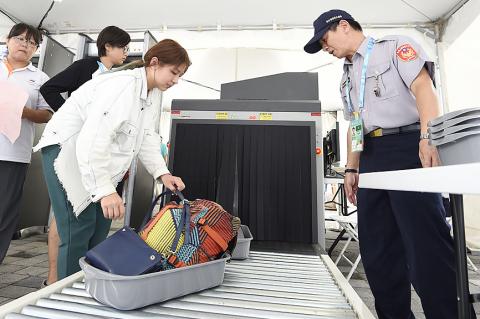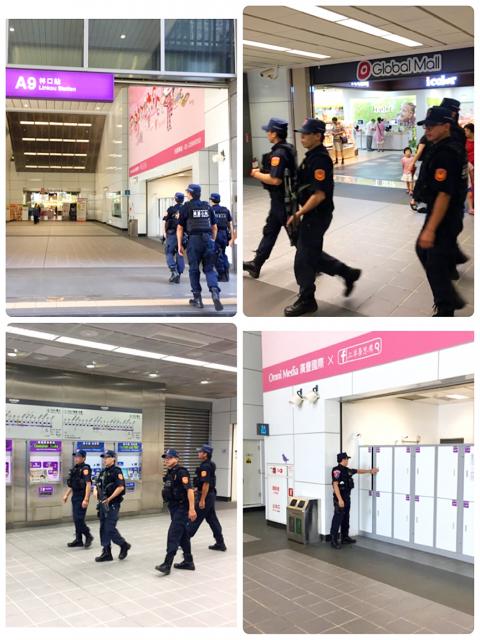The government is to link its Advanced Passenger Information System to systems in the US, Japan and Southeast Asian nations, in a move designed to help prevent terrorists entering Taiwan, with the Taipei Universiade to start on Aug. 19, officials said yesterday.
The system compares passenger lists to customs data to prevent “99.9 percent of all suspect individuals” from entering the nation, officials said, adding that such people would be prevented from boarding flights bound for Taiwan from participating nations.
Although Taiwan is not a member of Interpol and unable to obtain first-hand anti-terrorism information, it has bilateral information sharing agreements with the US and Japan, officials said.

Photo: Chen Chih-chu, Taipei Times
The US helped greatly to assemble a list of terror suspects, Taipei Mayor Ko Wen-je (柯文哲) said.
The system helped Taiwan identify a terror suspect from the United Arab Emirates as the suspect attempted to board a flight from Kaohsiung to Shanghai in 2014, officials said, adding that the suspect was repatriated to their home country.
Athletes, coaches and guests from nations participating in the Universiade are to clear customs as if they were on visa waiver programs, needing only to display their passport and invitation pass distributed by the Universiade organization team, officials said.

Photo: Wu Jen-chieh, Taipei Times
While only Taipei police and police from four other municipalities are to be “officially” on duty during the event, officials said that officers nationwide would be on stand-by.
The government expects protests during the games, as the Legislative Yuan is to hold its third extraordinary meeting by the end of the month, officials said.
On-duty officers would number 5,000, with 2,000 students from the Central Police University and 3,000 students from the Taiwan Police College called in to help.
In the event of large-scale protests or a terror attack, the nation has more than 70,000 police officers in reserve.
Separately, the Coast Guard Administration conducted a large-scale sweep aimed at preventing criminals from smuggling guns, drugs or explosives into Taiwan, Coast Guard 7th Offshore Flotilla Deputy Chief Cheng Wen-hao (鄭文豪) said.
Meanwhile, Ko yesterday afternoon announced a trial run of systems that would be used during the games’ opening and closing ceremonies.
Taipei residents should be aware that several Universiade events would require roads to be closed, Ko said, adding that the city would announce closures in advance.
The Universiade is to be the largest-ever multi-sport event hosted by Taiwan, bringing 11,397 representatives from 131 nations, including 7,639 athletes, the Sports Administration said.
Additional reporting by CNA

AGING: As of last month, people aged 65 or older accounted for 20.06 percent of the total population and the number of couples who got married fell by 18,685 from 2024 Taiwan has surpassed South Korea as the country least willing to have children, with an annual crude birthrate of 4.62 per 1,000 people, Ministry of the Interior data showed yesterday. The nation was previously ranked the second-lowest country in terms of total fertility rate, or the average number of children a woman has in her lifetime. However, South Korea’s fertility rate began to recover from 2023, with total fertility rate rising from 0.72 and estimated to reach 0.82 to 0.85 by last year, and the crude birthrate projected at 6.7 per 1,000 people. Japan’s crude birthrate was projected to fall below six,

Conflict with Taiwan could leave China with “massive economic disruption, catastrophic military losses, significant social unrest, and devastating sanctions,” a US think tank said in a report released on Monday. The German Marshall Fund released a report titled If China Attacks Taiwan: The Consequences for China of “Minor Conflict” and “Major War” Scenarios. The report details the “massive” economic, military, social and international costs to China in the event of a minor conflict or major war with Taiwan, estimating that the Chinese People’s Liberation Army (PLA) could sustain losses of more than half of its active-duty ground forces, including 100,000 troops. Understanding Chinese

US President Donald Trump in an interview with the New York Times published on Thursday said that “it’s up to” Chinese President Xi Jinping (習近平) what China does on Taiwan, but that he would be “very unhappy” with a change in the “status quo.” “He [Xi] considers it to be a part of China, and that’s up to him what he’s going to be doing, but I’ve expressed to him that I would be very unhappy if he did that, and I don’t think he’ll do that. I hope he doesn’t do that,” Trump said. Trump made the comments in the context

SELF-DEFENSE: Tokyo has accelerated its spending goal and its defense minister said the nation needs to discuss whether it should develop nuclear-powered submarines China is ramping up objections to what it sees as Japan’s desire to acquire nuclear weapons, despite Tokyo’s longstanding renunciation of such arms, deepening another fissure in the two neighbors’ increasingly tense ties. In what appears to be a concerted effort, China’s foreign and defense ministries issued statements on Thursday condemning alleged remilitarism efforts by Tokyo. The remarks came as two of the country’s top think tanks jointly issued a 29-page report framing actions by “right-wing forces” in Japan as posing a “serious threat” to world peace. While that report did not define “right-wing forces,” the Chinese Ministry of Foreign Affairs was